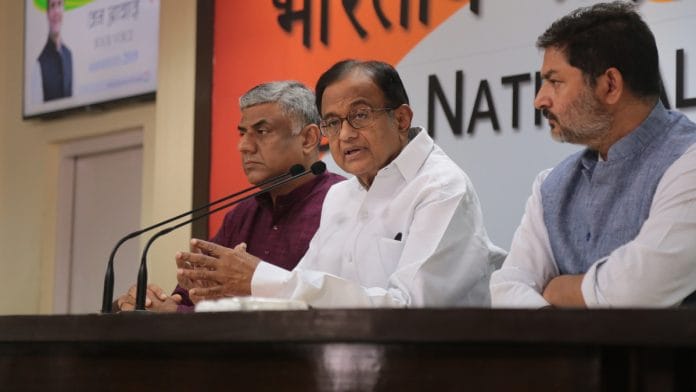Congress is getting views from the common man and party workers on what to include in its manifesto for the 2019 Lok Sabha elections.
New Delhi: Fuel price hike, jobs, inflation and women’s safety are among the major suggestions people have flagged to the Congress party as part of its manifesto consultation process that began on 1 October, party sources said.
So far, the party has organised 31 meetings in New Delhi, Aligarh, Bengaluru, Chandigarh, Kochi, Mumbai and other cities. The Congress has named the process ‘Jan Awaaz’ (Voice of the People).
“The recurring themes at the meetings have been about fuel price hike, safety, inflation, job creation and unemployment,” said a Congress leader.
“Currently, we are noting all the suggestions and it will be decided which all to incorporate. It is important to know what the public expects from us,” the Congress leader added,
Consultation to continue until January
The Congress Monday sought public participation in the process of drafting the 2019 Lok Sabha election manifesto, asking them to post suggestions on a dedicated interactive website created exclusively for it.
“We want people and party workers to send their suggestions. We want to make this process as interactive as possible,” said P. Chidambaram, former finance minister and chairman, Congress manifesto committee, while launching the website manifesto.inc.in.
“We will draft the manifesto and give it to the Central Working Committee. The process of consultations will go well into December and January to ensure people have a lot of time to engage in the process,” he added.
Chidambaram said while the soft launch of the process started on 1 October, more consultations will take place now.
Congress president Rahul Gandhi is also expected to attend some of these meetings.
Also read: Congress goes BJP way to draft manifesto for 2019 Lok Sabha elections
Multi-lingual consultations
“The manifesto invites suggestions in 16 languages and the Chidambaram-led panel said it would factor in every recommendation that came,” said manifesto panel convener Rajeev Gowda.
Asked when the manifesto would be launched, Chidambaram said that was for the Congress Working Committee to decide.
While Chidambaram acknowledged that farm loan waiver was one of the suggestions that came up during consultations, he maintained that the Congress wouldn’t make any formal promises on the issue yet.
Party plans to hold 150 meetings
The party is planning to hold more than 150 consultation meetings, including in a town hall format, with experts from different fields and common people to seek their suggestions for the manifesto.
Apart from attending the meetings, people will also be able to send their suggestions through the website, email and WhatsApp.
In its 2014 manifesto, the Congress had promised to create 100 million jobs and to introduce the Goods and Services Tax (GST) within 100 days of coming to power. It had also promised the passage of the women’s reservation bill and to set up a national environment appraisal and monitoring body.
The manifesto carried a pledge of $1 trillion investment in infrastructure over a decade. It had promised to waive all export taxes. The party had also promised to enact law to ensure right to pension and right to health, among other policies.
Also read: 2019 Lok Sabha elections not Modi vs Rahul battle, says Congress leader Jairam Ramesh
Focus on jobs, farm distress, Rafale deal
Sources said the party’s manifesto committee has already zeroed in on jobs and farm distress as its focus areas. It is likely to promise a farm loan waiver in the manifesto, said party sources.
It will also look to corner the BJP on the issue of corruption, including the alleged Rafale scam, to neutralise its consistent attempt to paint opposition leaders as corrupt and also to ‘expose’ the ruling party’s claims of probity and transparency.
“These meetings are open to all and we are keeping track of all suggestions. Some of the meetings are in a town hall format while others are closed-door affairs,” said a senior party leader who didn’t wish to be named.
As part of the manifesto drafting process, 20 sub-groups have been formed and each member will hold at least 8-10 consultations, including on economic policy, national security and foreign policy, farmers and agriculture.







There could be a well reasoned critique on demonetisation as well.
Freebies subsidies reservation are the standard promises of all parties. No leader in Bharat has the guts to talk about free market capitalism.